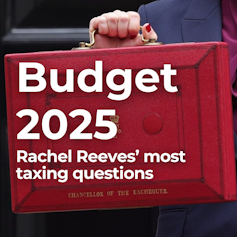How Trump’s trade policies are weakening international climate commitments
- Written by Maha Rafi Atal, Adam Smith Senior Lecturer in Political Economy, School of Social and Political Sciences, University of Glasgow
The Cop30 climate summit is under way in Brazil under the shadow of US president Donald Trump’s second term. Delegates from around the world have poured into the Amazonian port of Belém for the conference, which promises to focus on economic development and the fight against global poverty, as well as green tech and finance.
For the first time in three decades of the talks, there are no high-level US officials expected at Cop30[1]. Since taking office in January, the Trump administration has withdrawn[2] the United States from the Paris climate agreement[3], dismantled key environmental regulations[4], and scrapped Biden-era tax credits[5] which were designed to promote wind and solar power.
And now Trump’s aggressive tariff policy[6] is rippling through the global economy, forcing countries to rethink how they balance trade and climate commitments.
For the UK, the consequences are particularly acute. Post-Brexit, Britain must maintain close regulatory alignment with the European Union on many goods. This effectively means that despite having quit the EU, the UK voluntarily follows its single market rules in some sectors in order to minimise trade friction.
For its part, the bloc has made compliance with European environmental standards a requirement for firms in key sectors looking to export into the EU market. Under this regulation[7], a foreign company selling products to European consumers must report on the carbon footprint of their factories overseas. Companies are fined per unit of carbon emitted before the product gets to the EU.
To be exempt, companies will have to show that the foreign countries where the good was produced impose an equivalent type of carbon regulation to that in EU law.
These “carbon border” mechanisms are vital for cutting emissions[8] in a globalised economy. The UK has committed[9] to introducing a similar measure to some of the most polluting sectors (such as steel, aluminium, cement and fertiliser) in 2027.
At the same time, the UK government hopes that closer trade with the United States will drive economic growth. But the Trump administration is pressuring its European partners[10] to relax environmental standards, or exempt US companies from complying with them, in exchange for tariff relief. This could leave the UK caught between its two most important allies.
The ripple effects extend far beyond Europe. With the carbon border increasing the cost of exports to the EU and Trump’s tariffs doing the same for access to US markets, many countries are seeking new trading routes.
This creates openings for major carbon emitters such as China, Russia and the Gulf states to expand their influence through deals with developing nations that are unable to pay the premium for entry into US or European markets.
The result could be the creation of “sacrifice zones”[11] – regions that become dumping grounds for high-emission products such as electronics or vehicles made with steel or aluminium produced using cheaper, less sustainable production methods. This both damages local environments and deepens global inequality in the transition to a more sustainable economy.
Trump warned delegates at the UN General Assembly in September that what he termed the ‘green scam’ would lead their contries to fail.Meanwhile, tariffs are expected to slow down global economic growth[12]. Businesses are diverting funds from investment and job creation[13] to cover the extra cost of trade barriers – potentially wiping US$2 trillion[14] (£1.5 trillion) off world GDP over the next two years.
That shortfall could have serious implications for Cop30, where rich countries will be asked to increase financial support for poorer nations so that they can build renewable energy systems[15] and recover from[16] climate-related disasters such as floods and wildfires.
Amid all the uncertainty that Trump is creating with his impulsive and inconsistent approach to trade, governments may feel that they cannot afford to make these commitments right now. But the planet cannot afford for them to wait.

References
- ^ Cop30 (theconversation.com)
- ^ has withdrawn (theconversation.com)
- ^ Paris climate agreement (www.bbc.co.uk)
- ^ key environmental regulations (www.actonclimate.com)
- ^ Biden-era tax credits (www.whitehouse.gov)
- ^ tariff policy (theconversation.com)
- ^ this regulation (trade.ec.europa.eu)
- ^ vital for cutting emissions (eprints.gla.ac.uk)
- ^ has committed (www.gov.uk)
- ^ pressuring its European partners (www.ft.com)
- ^ “sacrifice zones” (giace.org)
- ^ global economic growth (www.theguardian.com)
- ^ investment and job creation (www.cnbc.com)
- ^ US$2 trillion (www.bloomberg.com)
- ^ build renewable energy systems (www.unepfi.org)
- ^ recover from (unfccc.int)
- ^ Sign up for free here (www.lse.ac.uk)







